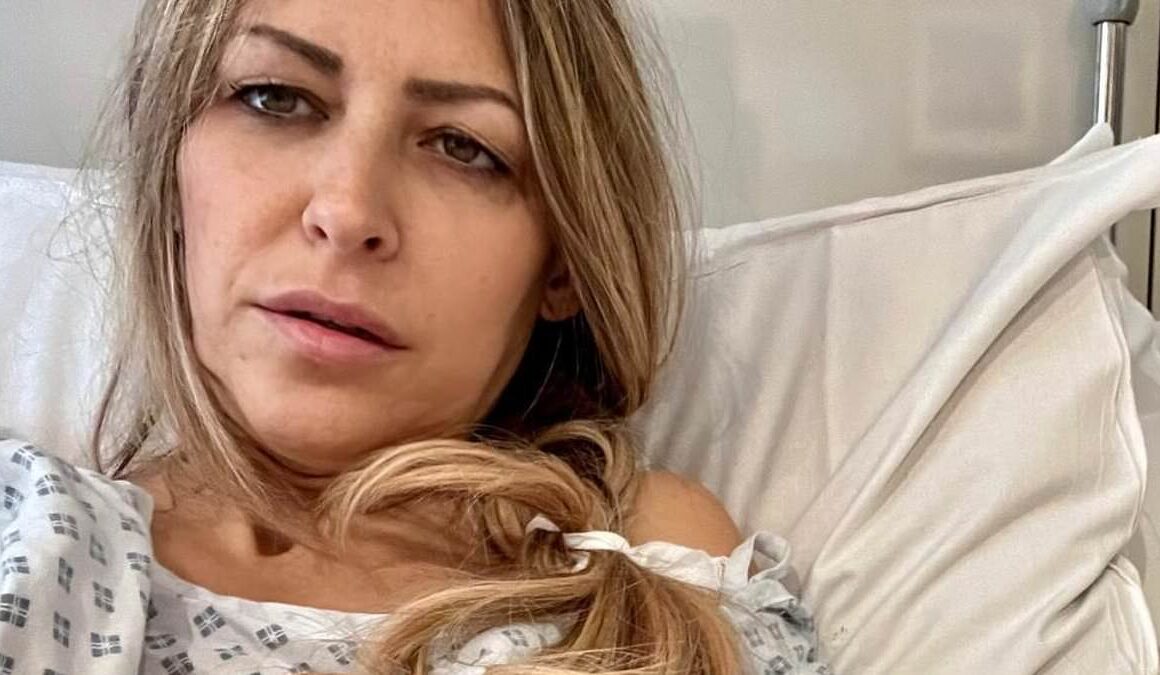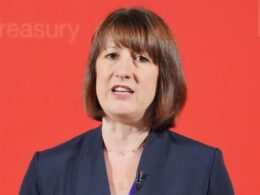A single mother who was diagnosed with two rare cancers just six weeks apart had to have six organs removed to save her life.
Hayley Shaw, 44, previously led an active lifestyle but pelvic pain and heavy periods led to the discovery of two cancerous uterine polyps in June 2023.
Hayley’s world was turned upside down when she was diagnosed with a rare form of uterine cancer which typically affects women over 70.
But just six weeks later Hayley was dealt another devastating blow as she was told she had contracted leukemia in her bone and blood cells.
The mother-of-one was forced to undergo a hysterectomy in order to remove the cancer in her uterus while she has already endured one round of chemotherapy to tackle her leukemia.

Single mother Hayley Shaw, 44, was diagnosed with two rare cancers just six weeks apart

Hayley was diagnosed with a rare form of uterine cancer in June last year

Hayley was dealt another devastating blow just six weeks later as she was told she had contracted leukemia in her bone and blood cells
After her first cancer diagnosis, Hayley was told she would have an induced menopause and need a hysterectomy – preventing her from having any more children.
Following her hysterectomy, Hayley – a former image consultant – returned home for a few weeks only to begin feeling unwell again.
She was admitted to a haematologist who found abnormal lymphocytes in her blood and diagnosed her with ‘hairy cell leukemia’ in August 2023 – named after the hair-like growths on the surface of the cells.
It was confirmed that she had 91 per cent leukemia cells in her bone marrow and 69 per cent in her blood.
Having not even processed her first diagnosis, Hayley described the second – which came just six weeks later – as ‘not feeling real’.
Hayley – who has an 11-year-old son named Lorenzo – had one round of chemotherapy in November and will need to have a further biopsy to establish the growth of cells and whether she needs more chemotherapy.
For her uterine cancer, Hayley needs regular six-month check ups of her bladder to see if the polyps return.

After her first cancer diagnosis, Hayley was told she would have an induced menopause and need a hysterectomy – preventing her from having any more children

Hayley also had one round of chemotherapy in November in order to tackle her leukemia
Hayley’s total hysterectomy meant she had all of uterus, cervix, both ovaries and both fallopian tubes removed.
Mother-of-one Hayley, from Chafford Hundrend, Essex, said: ‘Beforehand I was a very active and fit person working in an image consultancy and this just totally affected everything.
‘It has been the most traumatic time I’ve ever had in my entire life.
‘My son has had to live through this with me as well – it’s affected him too.
‘I hadn’t even processed the first one when the second diagnosis came. It didn’t feel real.’
Following her first diagnosis, Hayley was told her condition would put her into an early menopause.
She said: ‘It’s been very hard. It affects you a lot with brain fog, exhaustion, sleepless nights.
‘That cancer diagnosis normally happens in people over the age of 70 – it’s quite rare.
‘I was getting a lot of pelvic pain and heavy periods.
‘The ultrasound picked up on two polyps that I was initially told were benign. It turns out they were uterine cancer.’
Just weeks after her op, Hayley was left reeling from her second piece of devastating news. She said: ‘About four weeks after the hysterectomy I booked myself in to see a haematologist – I knew something wasn’t right.

Hayley’s total hysterectomy meant she had all of uterus, cervix, both ovaries and both fallopian tubes removed

Hayley also needs regular six-month check ups of her bladder to see if the polyps in her uterus return
‘He said I had abnormal lymphocytes in my blood. He did another blood test and that’s when it came back with another type of very rare cancer of the blood and bone marrow.
‘Two rare cancers diagnosed within six weeks. It was difficult.’
Throughout her ordeal, Hayley has had to deal with being a single mother and cancer discrimination.
She added: ‘It’s a massive thing to think about. My son was 10 when I got the diagnosis.
‘I tried to hide a lot of it from him initially but he found out and he was quite traumatised about it.
‘When I was first diagnosed I had no idea about it. I’ve had a lot of support from people all over the world who have had the same condition.
‘I felt that I experienced cancer discrimination and cancer ghosting which I experienced from some friends who I considered to be very good friends.
‘People just weren’t there for me.’
Hayley’s future treatment will vary on how the cancer reacts to what she has had done so far.
She said: ‘I’ll be having another biopsy to confirm if the chemo has been successful.
‘With this type of leukemia you need more chemo at some point, it just depends when.
‘If there are no signs of leukemia cells in the blood or bone marrow I will then have another biopsy in six months.
‘If the leukemia cells start creeping up again then I will have the next cycle of chemotherapy.
‘For this particular type of leukemia, they can treat it but it can never be cured. It’s something I have to live with.

To mark a year of her first diagnosis, Hayley climbed the O2 on the June 17 this year to raise money for the Leukemia Care charity

Hayley is pictured at the top of the O2 following her climb. The single mother revealed she came down with a virus the week before but still managed to do pull off the amazing feat
‘As for the uterine cancer, that could still come back even though I had six organs removed in total.
‘I still have to be checked every four to six months as it can come back to the bladder.
‘Between November and now I have had to go for check ups for both conditions quite regularly – sometimes three or four times a week. It was really exhausting.’
Hayley’s message to others is to simply talk to people who have been through similar ordeals.
‘When I first got diagnosed with this I was so worried as I hadn’t heard of it,’ she said.
‘I found a lot of comfort from these people as they had dealt with it for so long.
‘They’d become experts on it to the point where they knew more than some doctors did.’
To mark a year of her first diagnosis, Hayley climbed the O2 on the June 17 this year to raise money for the Leukemia Care charity.
She said: ‘It was very good but difficult. I came down with a virus the week before so on day of climb I had a fever and bone pain but I still managed to do it!’









